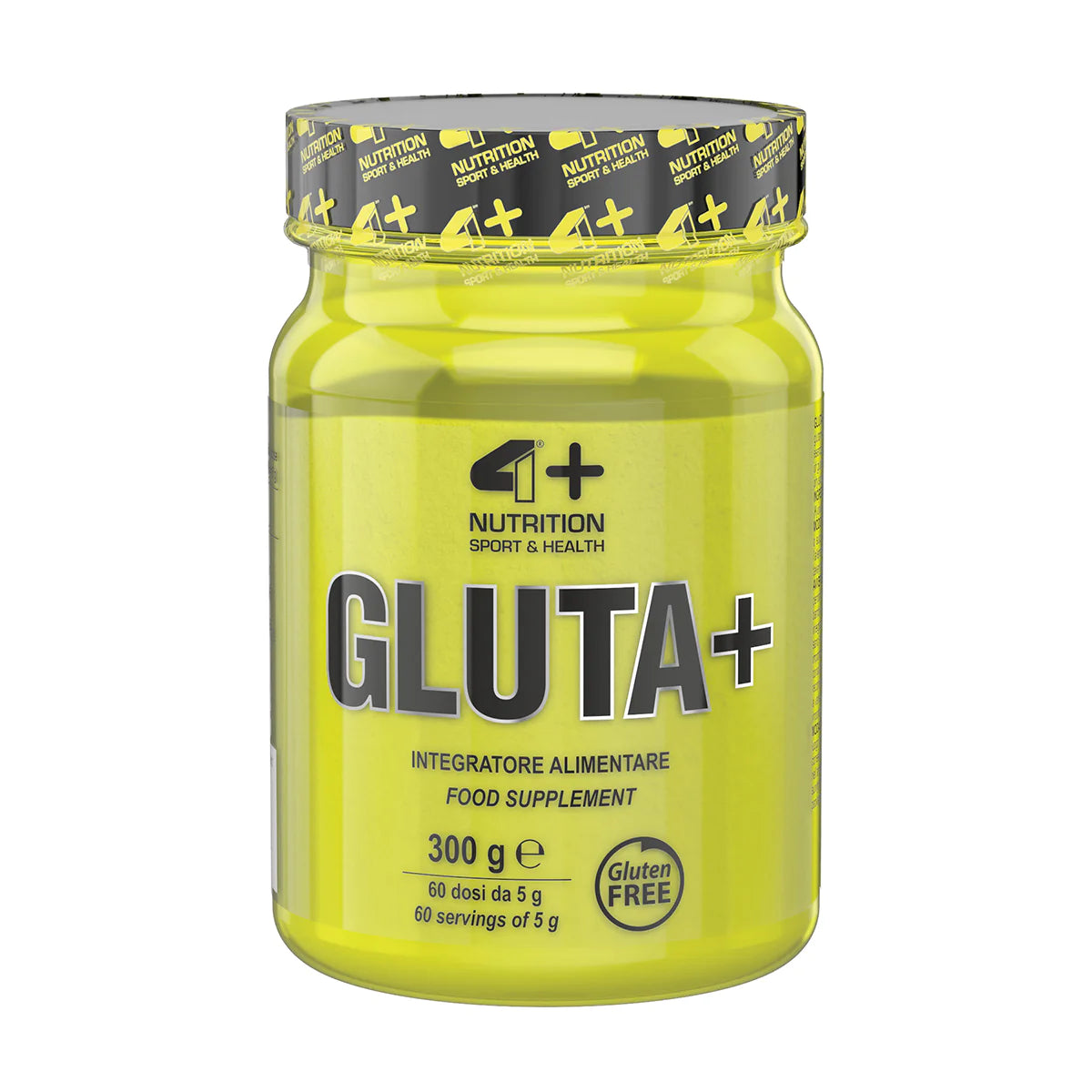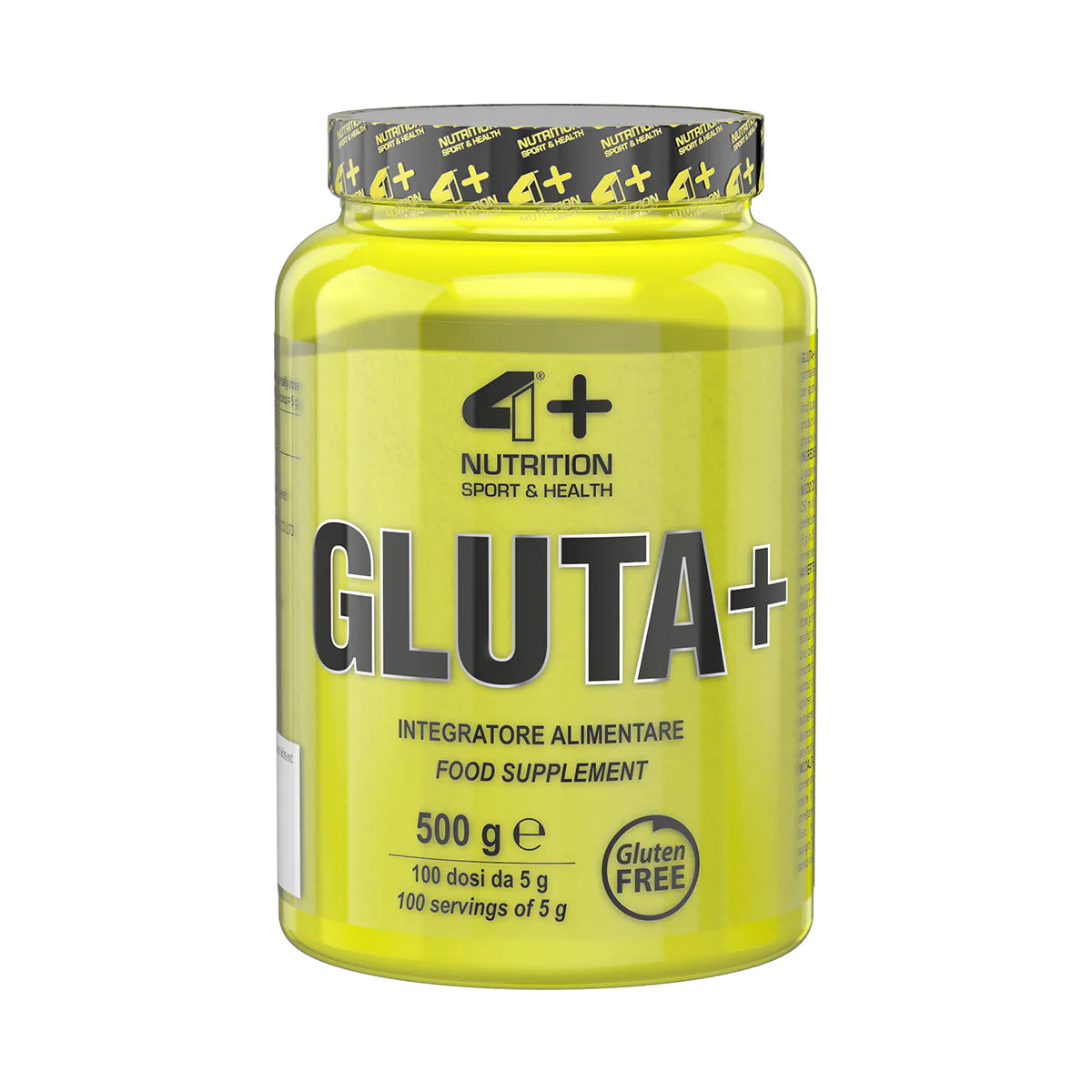4+ GLUTA + Nutrition
Glutamine is the amino acid that is most present in our organism (70% in the myocytes) and it very easily passes the cellular membranes. It is well known that its levels tend to decrease in all conditions of stress. It has so many potential functions that it is difficult to establish the most important ones and even more difficult to create a “classification” of those with the greatest impact.
It is the precursor of the purine and pyrimidine bases, namely the synthesis of RNA and DNA. It is a precursor of all amino acid-synthesis, and the synthesis of all the non-essential amino acids can originate from it; it therefore has a potentially anti-catabolic effect, and guaranteeing its presence and availability favors protein synthesis triggered by exercise. Its role in cellular synthesis is particularly interesting, more specifically those cells with a very high turnover, in particular those of the intestinal mucous and the lymphocytes. This amino acid can have an important role in the enteric function, which is often stressed during stress periods. Defense of the enteric and lymphocytic function turns into lower susceptibility to infections which often strike athletes during the charge phase.
In addition to these specific functions, glutamine also transports the nitrogen between organs, which favors the generic organic and metabolic functions that necessarily accelerate both during physical exercise and pathological stress.
Its important role in gluconeogenesis should be considered: if on the one hand it is true that a well-balanced diet should reduce the triggering of gluconeogenesis to a minimum, on the other hand very extended sessions of sport are becoming more popular, and in these cases it is very difficult not to have the energy support of amino acids. In this case glutamine plays an important role.
Remember also its decisive function in collagen synthesis (by proline – hydroxyproline), which preserves the tissues that are particularly stressed and helps recover those that are traumatized.
This amino acid has a generally useful role in stress conditions such as inflammation; consider that when taken it reduces the quantity of circulating inflammatory cytokines (4).
In substance, the polyhedral nature of glutamine does not accentuate a specific function, so giving it a special characteristic. Its preventive and protective qualities for athletes must not be forgotten.
Those who do amateur physical exercise have no reason to use it. Even though no type damage that may be caused by glutamine is known, even if used for long periods, it is advisable to stick to a dose of from 0.1 to 0.3g/kg daily.
Frequently Asked Questions
-
Nous appliquons une politique de retour de 30 jours, ce qui signifie que vous disposez de 30 jours après réception de votre article pour demander un retour.
Pour pouvoir être retourné, votre article doit être dans le même état que celui dans lequel vous l'avez reçu, non porté ou non utilisé, avec les étiquettes et dans son emballage d'origine. Vous aurez également besoin du reçu ou de la preuve d'achat.
Pour effectuer un retour, vous pouvez nous contacter à l'adresse support@melsfit.com , Si votre retour est accepté, nous vous enverrons une étiquette de retour non gratuite, ainsi que des instructions sur la manière et le lieu d'envoi de votre colis. Les articles renvoyés sans demande préalable de retour ne seront pas acceptés.
Les retours sont à la charge de l'acheteur, sauf en cas d'erreur du vendeur lors de l'expédition de la commande par exemple produit erroné ou excédentaire envoyé ou encore informations erronées de la part du vendeur sur la page du produit.Vous pouvez toujours nous contacter pour toute question relative aux retours à l'adresse support@melsfit.com.
-
Veuillez inspecter votre commande à la réception et nous contacter immédiatement si l'article est défectueux, endommagé ou si vous recevez le mauvais article, afin que nous puissions évaluer le problème et y remédier.
-
Certains types d'articles ne peuvent pas être retournés, comme les produits périssables (tels que les aliments, les fleurs ou les plantes), les produits sur mesure (tels que les commandes spéciales ou les articles personnalisés) et les produits de soins personnels (tels que les produits de beauté). Nous n'acceptons pas non plus les retours de produits dangereux, de liquides inflammables ou de gaz. N'hésitez pas à nous contacter si vous avez des questions ou des inquiétudes concernant votre article spécifique.
Malheureusement, nous n'acceptons pas les retours d'articles soldés ou de cartes-cadeaux. -
Le moyen le plus rapide de vous assurer d'obtenir ce que vous voulez est de retourner l'article que vous avez et, une fois le retour accepté, d'effectuer un achat séparé pour le nouvel article.
-
Nous vous informerons dès que nous aurons reçu et inspecté votre retour, et nous vous ferons savoir si le remboursement a été approuvé ou non. Si le remboursement est approuvé, vous serez automatiquement remboursé par le biais de votre mode de paiement d'origine. N'oubliez pas que le traitement et l'affichage du remboursement par votre banque ou votre société de carte de crédit peuvent prendre un certain temps.
-
S'inscrire
500 Loyalty pointsPasser une commande
7 Loyalty points pour chaque tranche d'achat de 1 CHFSuivre sur Instagram
200 Loyalty pointsFêter un anniversaire
500 Loyalty points








